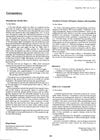 2 citations,
January 2018 in “Dermatology Review/Przegląd Dermatologiczny”
2 citations,
January 2018 in “Dermatology Review/Przegląd Dermatologiczny” Use trichoscopy to diagnose hair loss; treat with minoxidil, finasteride, or dutasteride; consider platelet-rich plasma and spironolactone.
[object Object]  January 2023 in “Brazilian Journal of Pharmaceutical Sciences”
January 2023 in “Brazilian Journal of Pharmaceutical Sciences” A method was found to accurately measure spironolactone and canrenone in blood samples using liquid chromatography-mass spectrometry.
November 2022 in “Clinical, Cosmetic and Investigational Dermatology” The combined treatment for hair loss is effective, easy to use, and has mild side effects.
 13 citations,
October 1993 in “International Journal of Dermatology”
13 citations,
October 1993 in “International Journal of Dermatology” Minoxidil effectively promotes hair regrowth in younger patients with small balding areas.
 February 2024 in “Skin Research and Technology”
February 2024 in “Skin Research and Technology” Microneedle therapy combined with serum effectively increases hair count in people with hair loss, with no side effects.
 68 citations,
January 2022 in “International Journal of Molecular Sciences”
68 citations,
January 2022 in “International Journal of Molecular Sciences” PCOS management includes lifestyle changes and medications, with ongoing research into repurposed drugs for better treatment options.
January 2020 in “Springer eBooks” 
There are many treatments for common hair loss, but more trials are needed to decide which are best.
 89 citations,
November 2014 in “International Journal of Nanomedicine”
89 citations,
November 2014 in “International Journal of Nanomedicine” Using nanostructured lipid carriers to deliver spironolactone could improve treatment for hair loss.
 80 citations,
December 2017 in “International Journal of Dermatology”
80 citations,
December 2017 in “International Journal of Dermatology” Low-dose oral minoxidil and spironolactone combo effectively reduces hair loss and improves hair density in women.
 78 citations,
May 1989 in “The Journal of Clinical Endocrinology & Metabolism”
78 citations,
May 1989 in “The Journal of Clinical Endocrinology & Metabolism” Spironolactone effectively reduces hair growth in women with hirsutism and is generally well-tolerated.
 53 citations,
May 2010 in “PubMed”
53 citations,
May 2010 in “PubMed” Spironolactone helps regrow hair in women with hair loss.
 32 citations,
October 2003
32 citations,
October 2003 Spironolactone is better than placebo for reducing excessive hair growth in women, but its effectiveness for acne is unclear due to small study sizes.
 1 citations,
September 2020 in “Actas Dermo-Sifiliográficas”
1 citations,
September 2020 in “Actas Dermo-Sifiliográficas”  21 citations,
May 2008 in “Talanta”
21 citations,
May 2008 in “Talanta” New, cheaper method measures finasteride in tablets accurately and quickly.
 19 citations,
July 1990 in “Cleveland Clinic journal of medicine”
19 citations,
July 1990 in “Cleveland Clinic journal of medicine” Androgen excess disorders in women were effectively treated with spironolactone, estrogen, and dexamethasone.
 November 2020 in “Elsevier eBooks”
November 2020 in “Elsevier eBooks” Antiandrogens and androgen inhibitors like spironolactone, finasteride, and dutasteride can treat hair loss and skin conditions, but they have risks and side effects, including potential harm to pregnant women and risks of cancer and heart issues. Herbal remedies also have antiandrogenic effects but lack safety validation.
 45 citations,
June 2008 in “Journal of pharmaceutical and biomedical analysis”
45 citations,
June 2008 in “Journal of pharmaceutical and biomedical analysis” The method effectively identifies banned substances in hair loss and skin disease cosmetics.
 September 1987 in “International Journal of Dermatology”
September 1987 in “International Journal of Dermatology” Cimetidine is not a first-choice treatment for female hair loss, and there's no consistently successful treatment for this condition in men or normal hormone level women.
 212 citations,
September 2008 in “Journal of The American Academy of Dermatology”
212 citations,
September 2008 in “Journal of The American Academy of Dermatology” Minoxidil and finasteride treat hair loss in men, while minoxidil treats hair loss in women.
 110 citations,
August 2016 in “Drugs”
110 citations,
August 2016 in “Drugs” Minoxidil is the only FDA-approved topical drug for treating male or female pattern hair loss, and other medications like finasteride and dutasteride can also increase hair growth.
 100 citations,
April 2010 in “Expert Opinion on Pharmacotherapy”
100 citations,
April 2010 in “Expert Opinion on Pharmacotherapy” Hair loss in men treated best with early medication or transplant, new treatments researched.
 52 citations,
June 1999 in “Endocrinology and Metabolism Clinics of North America”
52 citations,
June 1999 in “Endocrinology and Metabolism Clinics of North America” Antiandrogen treatments combined with oral contraceptives can help manage hair growth and hair loss in women with PCOS.
 30 citations,
January 2000 in “Dermatologic Clinics”
30 citations,
January 2000 in “Dermatologic Clinics” Finasteride and minoxidil are effective FDA-approved treatments for androgenetic alopecia.
 30 citations,
January 1998 in “Dermatology”
30 citations,
January 1998 in “Dermatology” Birth control pills and cyproterone acetate can help treat acne in women, especially when linked to hormonal issues.
 27 citations,
January 2013 in “Indian Journal of Dermatology, Venereology and Leprology”
27 citations,
January 2013 in “Indian Journal of Dermatology, Venereology and Leprology” PCOS is a complex disorder managed by treating symptoms and requires a team of specialists.
 26 citations,
October 2016 in “Clinics in Dermatology”
26 citations,
October 2016 in “Clinics in Dermatology” Hormonal treatments can improve acne, but they come with potential side effects and risks.
[object Object]  22 citations,
March 2000 in “Clinics in Dermatology”
22 citations,
March 2000 in “Clinics in Dermatology” Many treatments for hair loss lack proper testing and FDA approval, so their effectiveness is uncertain.
 21 citations,
May 2016 in “The Cochrane library”
21 citations,
May 2016 in “The Cochrane library” Topical minoxidil helps treat female pattern hair loss, but more research needed for other treatments.
 19 citations,
January 1997 in “Dermatologic Clinics”
19 citations,
January 1997 in “Dermatologic Clinics” Most treatments for hair loss in 1997 were not effective for most people, and maintaining hair growth was difficult.



























